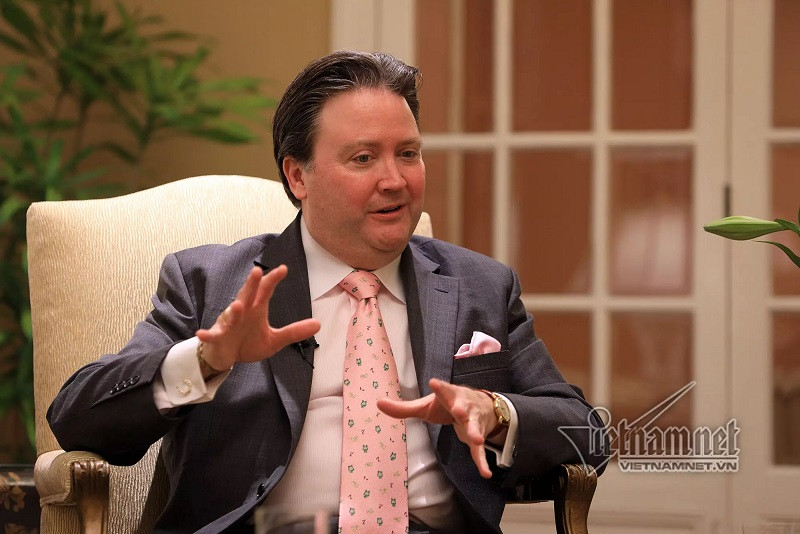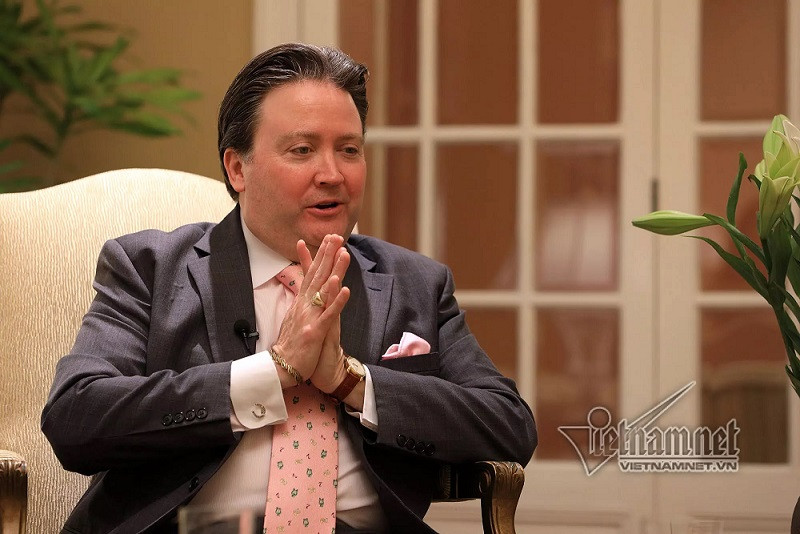Prime Minister Pham Minh Chinh recently made a trip to the US to attend the ASEAN-US Special Summit, to visit and work in the US and with the United Nations from May 11 to 17. What results, multilaterally and bilaterally, were achieved from this trip?
VietNamNet spoke with the US Ambassador to Vietnam Marc Knapper about this issue.

The Ambassador said:
This was an opportunity to celebrate 45 years of relations between the US and ASEAN. We wanted to take this opportunity to find ways to grow even further the relationship between the US and the countries of ASEAN, and ASEAN as an organization.
So, whether it was in areas such as maritime cooperation, people to people ties, education, health. These are areas which we already have deep relations, but we seek to deepen them even further.
How do you evaluate Vietnam's contributions and initiatives at the ASEAN-US Special Summit?
We very much value and appreciate the leadership role that Vietnam has played, is playing, and will continue to play in the future, whether it’s in areas such as maritime cooperation, etc. For example, Vietnam is a leading partner of the United States when it comes to strengthening the ties between our two coast guards and I think can serve as a model for other countries in ASEAN.
In health cooperation, Hanoi is the host of our regional Center for Disease Control (CDC) office, which can provide regional support to address regional and global health issues.
Vietnam is helping to lead the way to pave an even stronger and more cooperative relationship between the United States and ASEAN.
Through the speech of Prime Minister Pham Minh Chinh at the Center for Strategic and International Studies (CSIS), we can see Vietnam’s current interests. Regarding foreign affairs, these are: Upholding multilateralism, peace and development cooperation, and international law, in which Vietnam is committed to being a reliable partner and responsible member of the international community. Economically, they are: green growth, technological innovation, digital transformation and supply chain diversification. Regarding climate change response, it is about implementing commitments under the Paris Agreement and the COP26.
What are the US's commitments to help Vietnam achieve these goals?
We very much welcome the leadership role that Vietnam is playing both regionally and globally. Vietnam was the host of APEC in 2017, the chair of ASEAN in 2020, and a member of the UN Security Council 2020-2021.
We’ve seen Vietnam emerge as a real leader on the regional and global stages and this is something that we welcome and appreciate very much.
As Prime Minister Pham Minh Chinh said, some of the areas of potential cooperation between the US and Vietnam include digital transformation, climate change, supply chain, resiliency, technological innovation. The United States government is prepared to work very closely with Vietnam on these critical areas.
Climate change, of course, is a very prominent example, when the former Secretary of State and now Special Presidential Envoy - John Kerry - was here in February, and when the Prime Minister met with him last week in Boston.
It was very clear that our two countries are well positioned to work very closely together, and the United States is very well prepared to work with Vietnam, whether it’s climate finance, of supplying technological means to address climate change, or providing human resource expertise to deal with the effects of climate change, and promote green energy transition. These are areas which United States is 100% committed to working with Vietnam to assist and make this clean and green transition a success.
In your opinion, what advantages in the current world and regional context, along with what just happened at the ASEAN-US Special Summit, make for further consolidating and strengthening ASEAN-US relations in general, and bilateral relations in particular?
Well, I think one of the advantages we enjoy with ASEAN is the fact that we are already a very well-established presence here in this part of the world.
US investment in ASEAN nations, for example, exceeds $1 trillion, which is actually more investment than the next three countries combined. So, I think it is well established here that we have some of the strongest, greatest companies in the world which have strong investments in this part of the world.
We are contributing daily to the efforts of ASEAN countries to transform their economies, to deal with the effects of climate change, to promote a free and open-ended Pacific, to promote freedom of navigation, freedom of overflight, to strengthen health cooperation, and so on.
We want to make the already strong relationship with ASEAN even stronger, just as we seek within ASEAN to make the relationship with Vietnam even stronger.
You know, one of the significant outcomes of this special summit was a commitment of the US and ASEAN to upgrade our relationship to a comprehensive strategic partnership. And we certainly hope that in the near future we can do the same with Vietnam to move from a comprehensive to a strategic partnership. Because we believe that our shared efforts to promote a strong, independent, and prosperous Vietnam certainly have many of the qualities that would be part of a strategic partnership.
I would like to mention an area that, at a recent press conference, you confirmed would be a promising area of bilateral cooperation. That is digital economy, digital transformation. During Prime Minister Pham Minh Chinh's recent working visit to the US, what specific commitments did the US and Vietnam make to promote cooperation?

Well, one of the advantages that the United States brings to the relationship with Vietnam when we talk about something like digital transformation is that not just the US government, but also the US private sector can engage in this, just as we saw a number of memoranda of understanding signed between American companies and Vietnamese counterparts. I think in the future you’ll see even more commitments by American companies to promote things like digital literacy, education for young people, and how to navigate this increasingly interconnected and digital world.
The Vietnamese Prime Minister had meetings with Microsoft, Google, Intel, Apple, all these great leading American companies, and all of them really want to be a part of this transformation that’s taking place here, because digital economy is going to lead prosperity not just here, but also globally.
And this is something, I think, that the United States very much want to be a part of. We want to cooperate and assist as best we can.
What are the priorities that you have set for your term in Vietnam?
Well, it’s a very long list. I’m not sure if we can accomplish everything during my time, but ultimately, I want to strengthen the partnership, and deepen the friendship between our two countries.
I think we can do that through strengthening trade and investment relations, promoting educational ties. I think we can strengthen our friendship by deepening our cooperation between our health systems, figuring out ways to build bridges between Vietnamese hospitals and American hospitals, between American universities and Vietnamese universities for education. Discovering ways to bring more young American people to Vietnam and send more young Vietnamese people to the US.
These people-to-people connections are the foundation, the shoulders upon which every other thing we do together can take place. The more interactions our two peoples have, the better we’ll be able to do in the future in other areas such as science - technology cooperation, security cooperation.
So, my goal is to figure out a way to bring as many Vietnamese and Americans together for our shared goals, because we do share interests and goals. Identifying those goals and identifying ways to actualize them is going to be one of my strong goals while I’m here.
Dieu Thuy